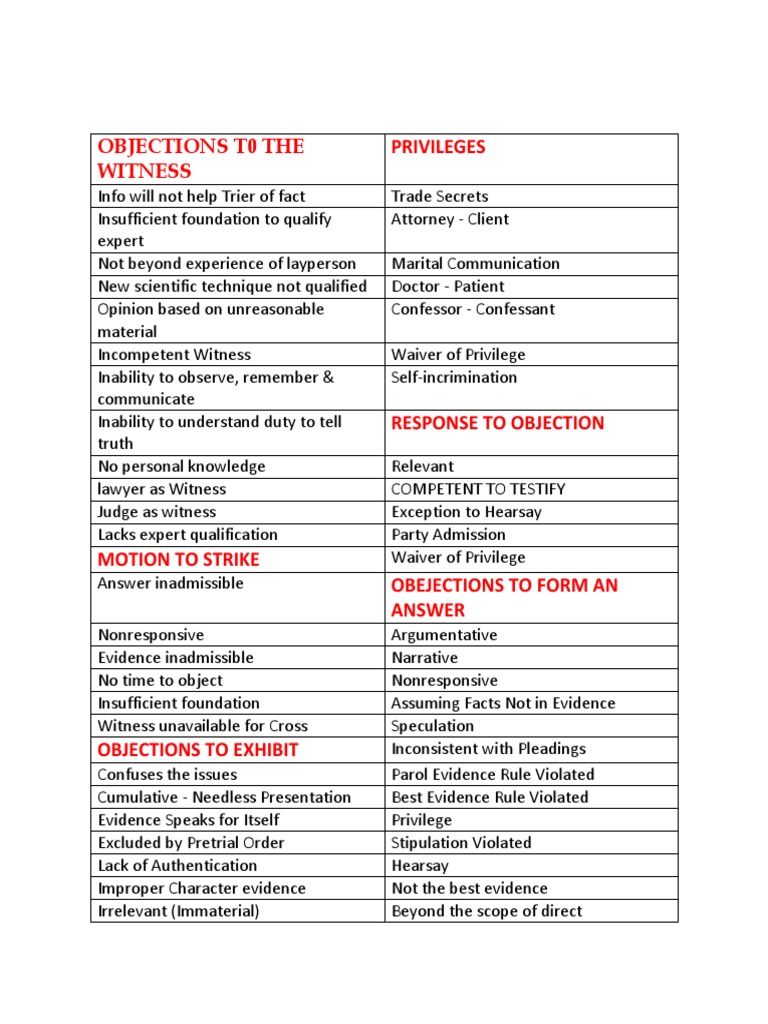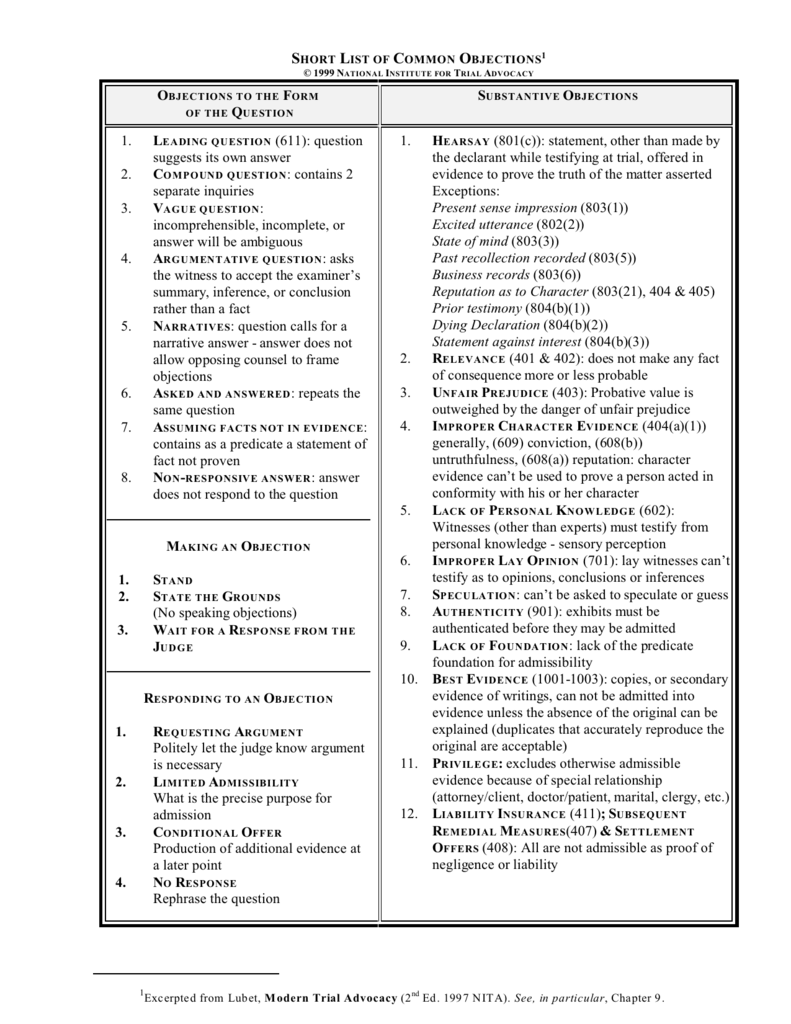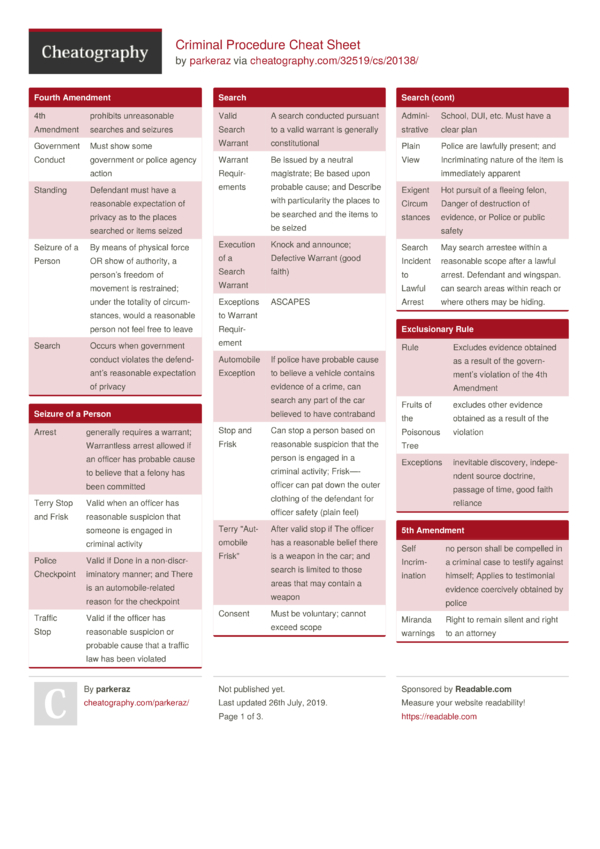Objections Cheat Sheet - This objection is sometimes used when counsel is “leading” or “argumentative” or “assumes facts not in evidence”. Objections cheat sheet generally objection supporting authority relevance evidence code §§ 210, 350 unduly prejudicial: Contains as a predicate a statement. And federal law is beyond the scope of this chart,. Here are some typical ways in which a question might draw an objection: Repeats the same question 7. A ssuming facts not in evidence: A complete list of all evidentiary objections and related supports in d.c. The question is capable of more than one.
Objections cheat sheet generally objection supporting authority relevance evidence code §§ 210, 350 unduly prejudicial: Repeats the same question 7. This objection is sometimes used when counsel is “leading” or “argumentative” or “assumes facts not in evidence”. The question is capable of more than one. A complete list of all evidentiary objections and related supports in d.c. A ssuming facts not in evidence: Contains as a predicate a statement. Here are some typical ways in which a question might draw an objection: And federal law is beyond the scope of this chart,.
A complete list of all evidentiary objections and related supports in d.c. Contains as a predicate a statement. The question is capable of more than one. This objection is sometimes used when counsel is “leading” or “argumentative” or “assumes facts not in evidence”. A ssuming facts not in evidence: Repeats the same question 7. Here are some typical ways in which a question might draw an objection: Objections cheat sheet generally objection supporting authority relevance evidence code §§ 210, 350 unduly prejudicial: And federal law is beyond the scope of this chart,.
Objections Cheat Sheet PDF
A ssuming facts not in evidence: A complete list of all evidentiary objections and related supports in d.c. Here are some typical ways in which a question might draw an objection: Repeats the same question 7. This objection is sometimes used when counsel is “leading” or “argumentative” or “assumes facts not in evidence”.
Sale > federal discovery objections cheat sheet > in stock
A complete list of all evidentiary objections and related supports in d.c. Contains as a predicate a statement. A ssuming facts not in evidence: This objection is sometimes used when counsel is “leading” or “argumentative” or “assumes facts not in evidence”. Objections cheat sheet generally objection supporting authority relevance evidence code §§ 210, 350 unduly prejudicial:
Court Objections Cheat Sheet prntbl.concejomunicipaldechinu.gov.co
Objections cheat sheet generally objection supporting authority relevance evidence code §§ 210, 350 unduly prejudicial: This objection is sometimes used when counsel is “leading” or “argumentative” or “assumes facts not in evidence”. And federal law is beyond the scope of this chart,. A complete list of all evidentiary objections and related supports in d.c. Here are some typical ways in.
Common Objections In Court Cheat Sheet prntbl.concejomunicipaldechinu
A ssuming facts not in evidence: The question is capable of more than one. This objection is sometimes used when counsel is “leading” or “argumentative” or “assumes facts not in evidence”. A complete list of all evidentiary objections and related supports in d.c. And federal law is beyond the scope of this chart,.
Objections Cheat Sheet
A complete list of all evidentiary objections and related supports in d.c. The question is capable of more than one. This objection is sometimes used when counsel is “leading” or “argumentative” or “assumes facts not in evidence”. Here are some typical ways in which a question might draw an objection: Contains as a predicate a statement.
Guide to the Most Common Discovery Objections Clio
Here are some typical ways in which a question might draw an objection: A complete list of all evidentiary objections and related supports in d.c. And federal law is beyond the scope of this chart,. This objection is sometimes used when counsel is “leading” or “argumentative” or “assumes facts not in evidence”. Contains as a predicate a statement.
Criminal Law Objection Cheat Sheet
This objection is sometimes used when counsel is “leading” or “argumentative” or “assumes facts not in evidence”. Objections cheat sheet generally objection supporting authority relevance evidence code §§ 210, 350 unduly prejudicial: The question is capable of more than one. Contains as a predicate a statement. A ssuming facts not in evidence:
Common Objections In Court Cheat Sheet prntbl.concejomunicipaldechinu
Objections cheat sheet generally objection supporting authority relevance evidence code §§ 210, 350 unduly prejudicial: Contains as a predicate a statement. Here are some typical ways in which a question might draw an objection: A complete list of all evidentiary objections and related supports in d.c. This objection is sometimes used when counsel is “leading” or “argumentative” or “assumes facts.
Court Objections Cheat Sheet prntbl.concejomunicipaldechinu.gov.co
Repeats the same question 7. This objection is sometimes used when counsel is “leading” or “argumentative” or “assumes facts not in evidence”. Here are some typical ways in which a question might draw an objection: A ssuming facts not in evidence: Contains as a predicate a statement.
Criminal Law Objection Cheat Sheet
Repeats the same question 7. Objections cheat sheet generally objection supporting authority relevance evidence code §§ 210, 350 unduly prejudicial: And federal law is beyond the scope of this chart,. The question is capable of more than one. Here are some typical ways in which a question might draw an objection:
And Federal Law Is Beyond The Scope Of This Chart,.
Repeats the same question 7. A complete list of all evidentiary objections and related supports in d.c. Objections cheat sheet generally objection supporting authority relevance evidence code §§ 210, 350 unduly prejudicial: Here are some typical ways in which a question might draw an objection:
This Objection Is Sometimes Used When Counsel Is “Leading” Or “Argumentative” Or “Assumes Facts Not In Evidence”.
A ssuming facts not in evidence: The question is capable of more than one. Contains as a predicate a statement.









